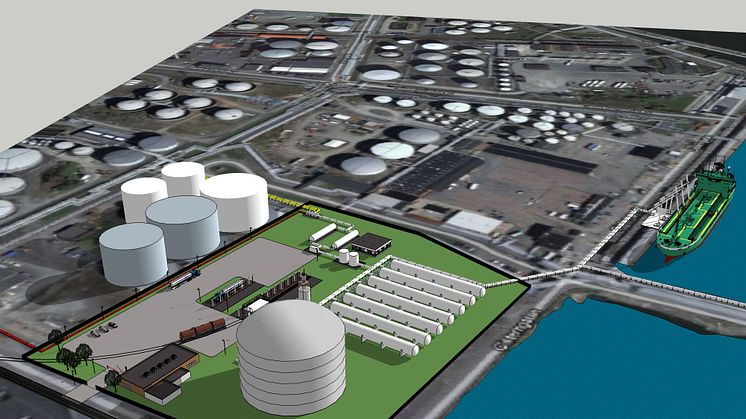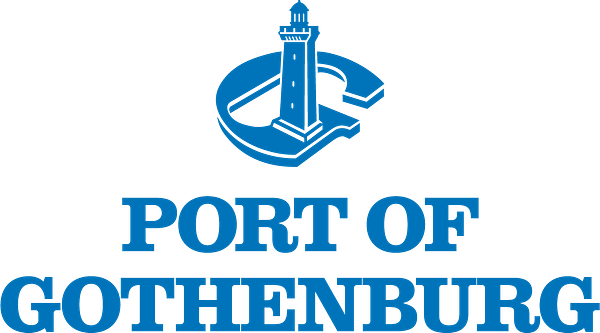
Press release -
EU supports Rotterdam-Gothenburg LNG initiative
- European Commission grants 34 million euro for the development of a small-scale LNG chain in Rotterdam and Gothenburg, accommodating LNG supply for cleaner maritime transport
- The collaboration between the ports for the infrastructure enables shipping companies to switch to Liquefied Natural Gas (LNG)-powered vessels
- LNG allows the shipping industry to meet the stringent 2015 emission requirements for the North Sea, English Channel and Baltic Sea
Tallinn, Gothenburg, Rotterdam, 16102013 - The LNG Rotterdam-Gothenburg project has been acknowledged by the European Commission as a priority project for European transport infrastructure development. The Commission grants 34 million euro (SEK 305 million) to develop small-scale infrastructure for liquefied natural gas (LNG) as an efficient and cleaner alternative for fuel oil and diesel in the North and Baltic Sea region. The Dutch-Swedish LNG collaboration involves the ports of Rotterdam and Gothenburg, together with gas infrastructure companies Gasunie (the Netherlands) and Swedegas (Sweden) and the international tank storage provider Vopak. The decision of the Commission represents a clear support for the realization of this initiative, which aims at creating
a new supply infrastructure for LNG in the maritime region of North Sea and Baltic Sea by 2015. LNG Rotterdam-Gothenburg is considered to be one of EU Commission's most prioritised ‘Motorways of the Seas’ projects.
There are essential environmental benefits to be gained from using LNG in transport and industry. For shipping, LNG as fuel poses lower sulphur oxide, nitrogen oxide, carbon dioxide and particle emissions than conventional fuels. With LNG, shipping companies are able to meet the strict
requirements of the Sulphur Emission Control Area (SECA), which prohibits any sulphur emission
exceeding 0.1 per cent in the North Sea, English Channel and Baltic by 2015.
The LNG initiatives in the port of Rotterdam and in the port of Gothenburg form a north and west European chain for maritime LNG supply. In Rotterdam, Gasunie and Vopak own the Gate terminal,
where large shipments of LNG from all over the world arrive. Both companies are planning to extend the Gate terminal site with LNG break-bulk facilities, allowing the export of smaller parcels of LNG for redistribution to satellite terminals, such as the planned terminal in Gothenburg. Vopak and the
Swedish gas infrastructure company Swedegas are planning a small-scale LNG terminal in Gothenburg to serve as key supply location for both shipping and industry in Scandinavia.
The collaboration creates an LNG connection between the largest port in Europe and the largest port in the Nordic region. Realization of the project will secure LNG supply facilities for the shipping companies, which is an important condition for shipping companies considering to invest in new LNG-powered vessels.
Further information
Cecilia Carlsson, Corporate Communications Manager, Port of Gothenburg: +46 31 368 75 45,
Saila Horttanainen, Vice President Corporate Communications, Swedegas AB: +46 70-622 76 06
Gerbert van Genderen Stort Global Manager External Communications, Royal Vopak: +31 10 400 2786
Chris Glerum, Manager External Communication Gasunie: +31 50 521 9111
Tie Schellekens, Press and Media Relations Port of Rotterdam: +31 6 5332 5334
About Port of Rotterdam Authority
The aim of the Port of Rotterdam Authority is to enhance the port of Rotterdam’s competitive
position as a logistics hub and world-class industrial complex. Not only in terms of size, but also quality. The core tasks of het Port Authority are to develop, manage and run the port in a sustainable way and to maintain a speedy and safe service for shipping.
About Port of Gothenburg
The Port of Gothenburg is the largest port in the Nordic region with 11,000 visits by vessels each year.
One-third of Swedish foreign trade passes through the Port of Gothenburg as well as 65 per
cent of all container traffic. The Port of Gothenburg has the broadest range of shipping routes within and outside Europe. The 25 rail shuttles that depart each day mean that companies throughout Sweden and Norway have a direct, environmentally smart link to the largest port in the Nordic region. The Port of Gothenburg has terminals for energy, cars, ro-ro, containers and passengers.
About Vopak
Royal Vopak is the world’s largest independent liquid bulk tank storage service provider by capacity
specializing in the storage and handling of liquid chemicals, gasses and oil products. The company operates 83 terminals with a combined storage capacity of more than 30 million cubic meters in 31
countries. Vopak’s terminals are strategically located for users along the major shipping routes. The majority of its customers are companies operating in the chemical and oil industries, for which Vopak stores a large variety of products destined for a wide range of industries.
About Gasunie
Gasunie is a European gas infrastructure company. Its network ranks among
the largest high pressure gas pipeline grids in Europe, consisting of 15,500 kilometres of pipeline in the Netherlands and northern Germany. Annually we transport about 125 bcm of natural
gas. Gasunie serves the public interest in the markets in which it is active and works to create value for its stakeholders. Gasunie is the first independent gas transport provider with a cross-border network in Europe. The company offers transport services via its subsidiaries Gasunie Transport Services B.V. (GTS) in the Netherlands and Gasunie Deutschland GmbH in Germany. Gasunie aims for the highest standards in safety, reliability, efficiency and sustainability.
About Swedegas AB
Swedegas is an infrastructure company that invests in smart energy systems. The company owns the
gas grid, which extends from Dragör in Denmark to Stenungsund in Sweden. Each year, Swedegas transmits energy equivalent to 15 TWh to distributors and directly connected customers. The gas grid
supplies natural gas to 33 municipal areas and several combined heat and power plants and companies. Swedegas is currently investing in the development of an infrastructure for biogas and liquefied natural gas (LNG).
Fact file: Port of Gothenburg
The Port of Gothenburg is the largest port in the Nordic region with 11,000 visits by vessels each year. One-third of Swedish foreign trade passes through the Port of Gothenburg as well as 65 per cent of all container traffic.
The Port of Gothenburg is the only port in Sweden with the capacity to receive the world's largest container vessels and has the broadest range of shipping routes within and outside Europe. The 26 rail shuttles that depart each day mean that companies throughout Sweden and Norway have a direct, environmentally smart link to the largest port in the Nordic region. The Port of Gothenburg has terminals for oil, cars, ro-ro, containers and passengers.

